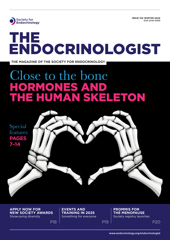George Mastorakos is based at the Medical School of the National and Kapodistrian University of Athens, Greece, where he is Professor of Endocrinology and Director of the Postgraduate MSc on Research in Female Reproduction. He is Senior Reproduction Editor for the Society’s open access journal Endocrine Connections. Here, he tells us about his passion for endocrinology and its many interconnecting disciplines, and some of the current hot topics in the field.
What inspired you to choose endocrinology?
I was drawn to endocrinology as a distinct part of human physiology. Even before it was named, researchers in endocrinology were interested in mechanisms explaining the intricate interconnections among subcellular, intercellular, organ and whole-body environments. They were among the first to study the cause–effect counter-regulatory response in a physiologic phenomenon (feedback), including the factor of time in the description of this response. Subsequently, many other fields in medicine followed this approach.
While, some decades ago, the nervous system was considered a key system in the regulation of the body, nowadays the hormonal system is recognised as the body’s principal regulator and reaction integrator.
Being attracted to endocrinology demands a certain curious spirit for research. I became interested in research at the bench in my second year at medical school and, since then, I’ve tried to combine translational or basic research with my clinical duties. I am, as a result, the author or co-author of more than 340 published papers.
Following last issue’s focus on stress and trauma, please tell us about your research interests in this area.
During my years training in research at the National Institutes of Health (NIH), I was fortunate to be introduced to the study of stress and trauma by George P Chrousos, a world-renowned, prominent scientist in this field.
Since Hans Selye (1907–1982) introduced the term ‘stress’ and gave the first description of the stress reaction, research has revealed that reactions originating from stress and trauma are major adaptive responses by most human physiology systems. Whether acutely excessive or chronic, these responses lead, in turn, to the development of pathologic entities, which (before becoming irrevocable) are functional and, therefore, correctable.
'Being attracted to endocrinology demands a certain curious spirit for research. I became interested in research at the bench in my second year at medical school and, since then, I’ve tried to combine translational or basic research with my clinical duties. I am, as a result, the author or co-author of more than 340 published papers.'
Along these lines, I was interested in revealing the development of stress reactions in normal and pathologic aspects of situations related to endocrinology, particularly female physiology, such as:
• the involvement of the immune/inflammatory reaction in the stress response
• the role of stressors in female fertility during in vitro fertilisation
• the deleterious effects of stressors (internal and external) for both the mother and the fetus (i.e. intrauterine growth restriction) during pregnancy, when stress reactions can epigenetically reprogramme the fetus to develop deleterious diseases in adult life (i.e. the development of insulin resistance)
• the combination of stressors with metabolic derangements during pregnancy that can occur at the origin of the development of autoimmune disorders, polycystic ovary syndrome, type 2 diabetes mellitus, arterial hypertension, sensitivity to psychiatric diseases, etc.
• the role of stressors (internal or external) in precipitating the timing of labour
• the role of stress in hypothalamic amenorrhoea.
What recent studies have you been involved with?
We used treadmill exercise (a model of a stressor) to compare flow-mediated dilation changes in women with and without PCOS, and found that the adaptation capacity of arterial endothelium is limited in PCOS.
We are also studying the role of chronic stress during pregnancy and its outcome on the neonate, having already reported that it negatively affects neonatal birth weight.
Information we have gathered (for a paper recently accepted by Endocrine Connections) strongly indicates that the use of synthetic corticoids during pregnancies with suspected premature labour (to prepare fetal respiratory system adaptation) might accelerate the unwanted premature labour via stimulation of placental corticotrophin-releasing hormone secretion.
Which are the current hot topics in your specialism?
'I think Endocrine Connections could become an important meeting point for scientists working across endocrine physiology and pathophysiology..'
Endocrinology is involved in many physiological aspects and diseases across a wide range of medical specialties. Hot topics arising from these overlaps include:
• endocrine aspects of female fertility, particularly explaining the abrupt loss of fecundability after the age of 40
• treating women hormonally in pre- and postmenopause
• investigating the endocrine aspects (positive and negative) of exercise
• endocrinology of psychiatric diseases, particularly in their milder aspects, which represent an important percentage of the population
• preventing the development of negative endocrine phenomena in individuals who receive bad nutrition and who are predisposed to obesity, as well as treating them successfully
• mobilising healthcare professionals to understand that in utero life predisposes us to diseases in adult life, by eventually developing the endocrinology of pregnancy as a subspecialty (not just a field of research).
What is involved in being a Senior Editor for Endocrine Connections?
Endocrine Connections, from its conception, was designed to go beyond the traditionally defined borders of endocrinology, covering basic to clinical (via translational) research needs in overlapping fields. As an Editor specialising in reproductive endocrinology, I have been focusing on further enhancing the quality of publications coming from fields adjacent to endocrinology, attracting scientists and clinicians in interconnecting disciplines to review for the journal. I think Endocrine Connections could become an important meeting point for scientists working across endocrine physiology and pathophysiology.
Are you interested in reviewing for Endocrine Connections? Email [email protected] to find out more.






